ElectricFlow
ElectricFlow is an enterprise-grade DevOps Release Automation platform that simplifies provisioning, build and release of multi-tiered applications. Our model-driven approach to managing environments and applications allows teams to collaborate on and coordinate multiple pipelines and releases across hybrid infrastructure in an efficient, predictable and auditable way.
Features
This Integration enables performing all the following Build Tasks using ElectricFlow Server. These tasks can be executed separately or combined sequentially.
- Publish Artifact to ElectricFlow Server
- Run Pipeline in ElectricFlow Server
- Call ElectricFlow Server Rest API
- Trigger Release in ElectricFlow Server
The following information is provided as to how an end user should configure the ElectricFlow Server connection as well as what parameters should be passed to ElectricFlow Server for each Build Task:
Setting up ElectricFlow Server Connections
In order to use and integrate with ElectricFlow, you would have to create endpoints in Visual Studio Team Services/Team Foundation Services. Navigate to Services/Endpoints and find ElectricFlow service endpoint. One or more configurations can be created to connect to and call APIs into ElectricFlow system. For each endpoint, following attributes need to be specified:
- Connection Name: Name of the ElectricFlow endpoint
- Server URL: URL for the ElectricFlow Server. For example,
https://<electric-flow-server>
- REST API Version: Version for the ElectricFlow REST API. For e.g., v1
- User Name: User name for the ElectricFlow
- User Password: User password for the ElectricFlow
- Override Electric Flow SSL Validation Check: By default SSL Validation Check will be performed. Choose this setting to override the check. If you do not want to override this check, perform the SSL certificate setup required in Jenkins and Electric Flow as per the Electric Flow Server documentation.
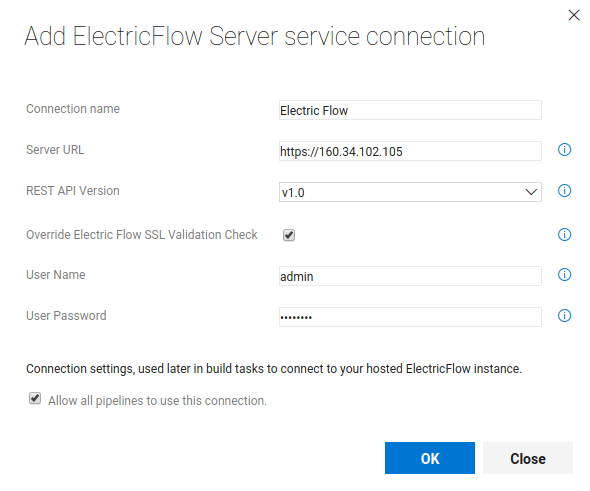
Publish Artifact to ElectricFlow Server
The parameters required to perform this Build Task are as follows:
- Endpoint: Endpoint URL of the ElectricFlow service
- Artifact Path: Location or path for the artifact files to be published to ElectricFlow. For e.g., MyProject/**/*-$BUILD_NUMBER.war
- Artifact Name: Name of the application artifact using the format
<group_id>:<artifact_key>. For example, "com.example:helloworld"
- Artifact Version: Version of the application artifact. For e.g., you can specify 1.0 or 1.0-$(Build.BuildNumber) that is based on Visual Studio Build variable.
- ElectricFlow Repository Name: Name of the ElectricFlow Repository
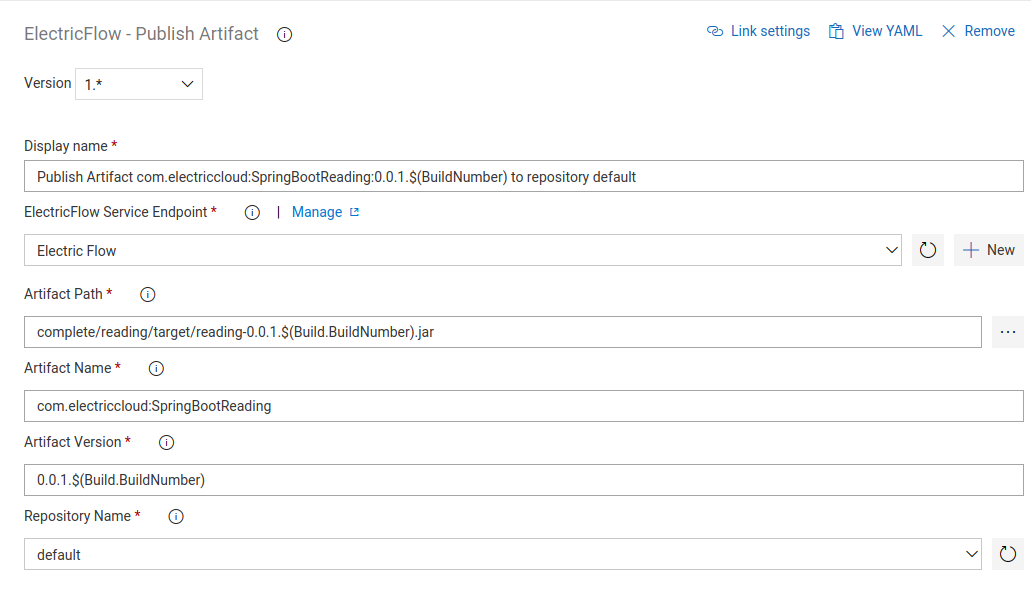
Run Pipeline in ElectricFlow Server
The parameters required to perform this Build Task are as follows:
- Endpoint: Endpoint URL of the ElectricFlow service
- Project Name: Name of the ElectricFlow project
- Pipeline Name: Name of the ElectricFlow pipeline
- (Optional) Pipeline Parameters
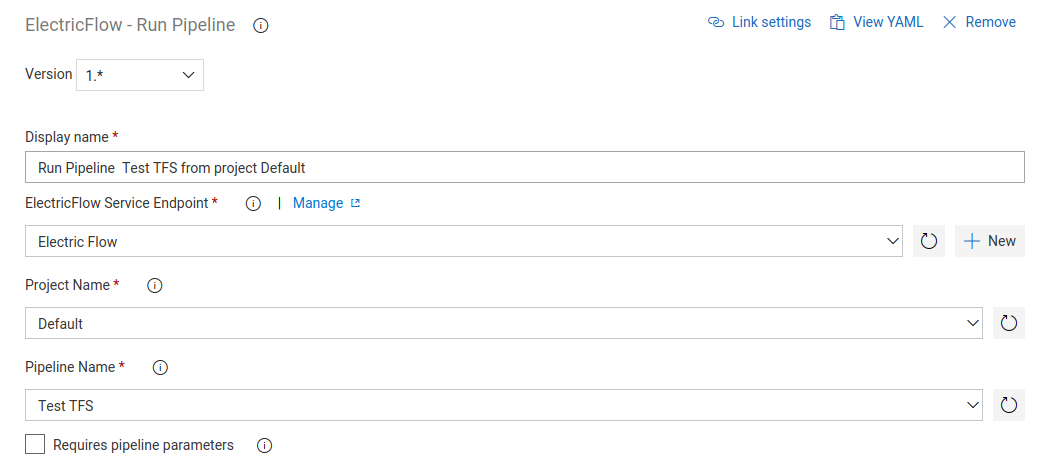
Call ElectricFlow Server Rest API
The parameters required to perform this Build Task are as follows:
- Endpoint: Endpoint URL of the ElectricFlow service
- Method: HTTP method to run
- Path: Path to the resource, e.g. /projects
- Parameters: Query parameters, in JSON or in key-value pairs.
- Payload: Enter request body.
- Result variable name: Enter variable name to store call results.
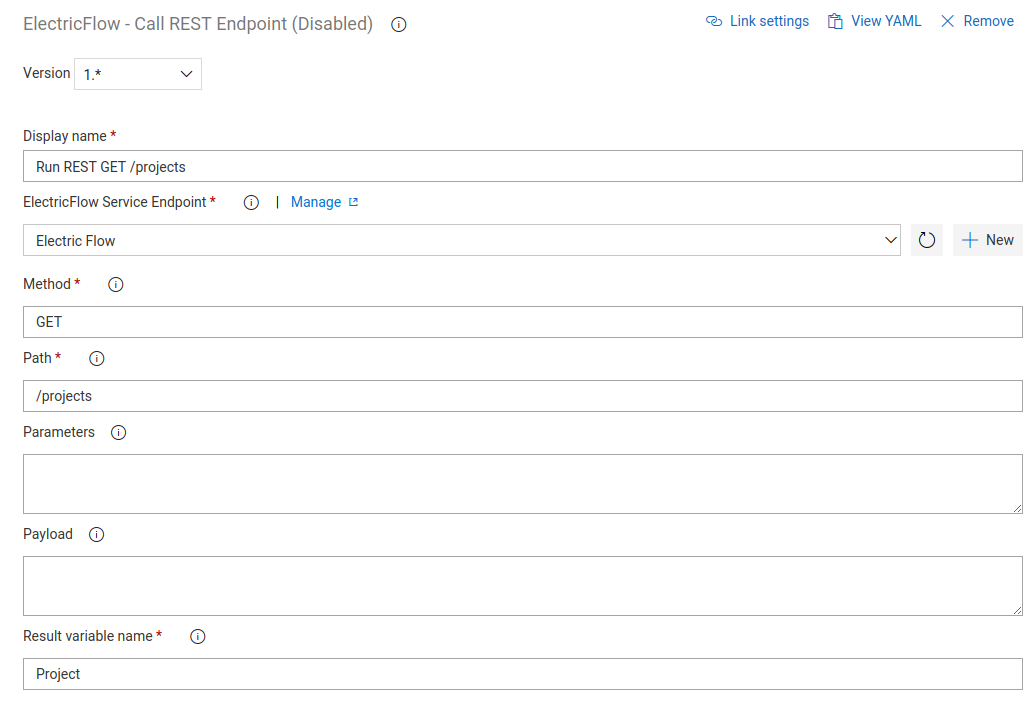
Trigger Release in ElectricFlow Server
The parameters required to perform this Build Task are as follows:
- Endpoint: Endpoint URL of the ElectricFlow service
- Project Name: Name of the ElectricFlow project
- Release Name: Name of the release in ElectricFlow project.
- Starting stage name: Specify the starting stage name in release pipeline.
- Stages to run: One or more stages to run in a pipeline associated with the release, comma-separated.
- Requires pipeline parameters: If checked, parameters will be passed to the pipeline.
- Pipeline parameters: Parameters for the pipeline call, in key=value pairs or in JSON format. E.g. myParam = value.
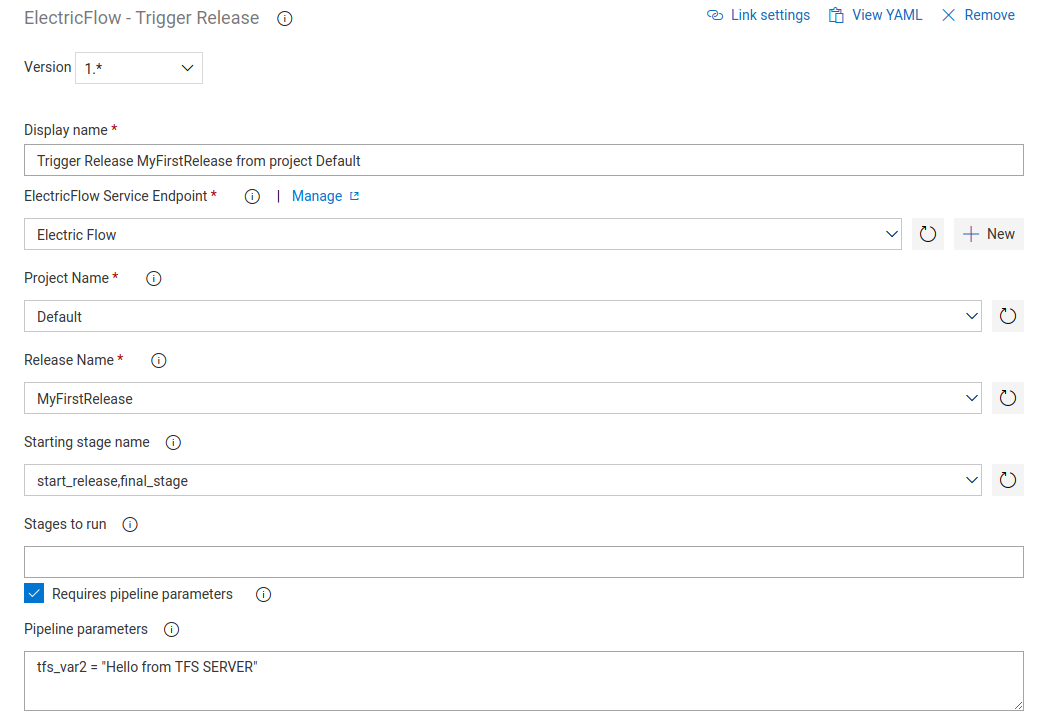
Release Notes
Release 1.0
Initial Release which supports all these Build Tasks
- Setting up ElectricFlow Server Connections
- Publish Artifact to ElectricFlow Server
- Run Pipeline in ElectricFlow Server
- Call ElectricFlow Server Rest API
- Trigger Release in ElectricFlow Server






